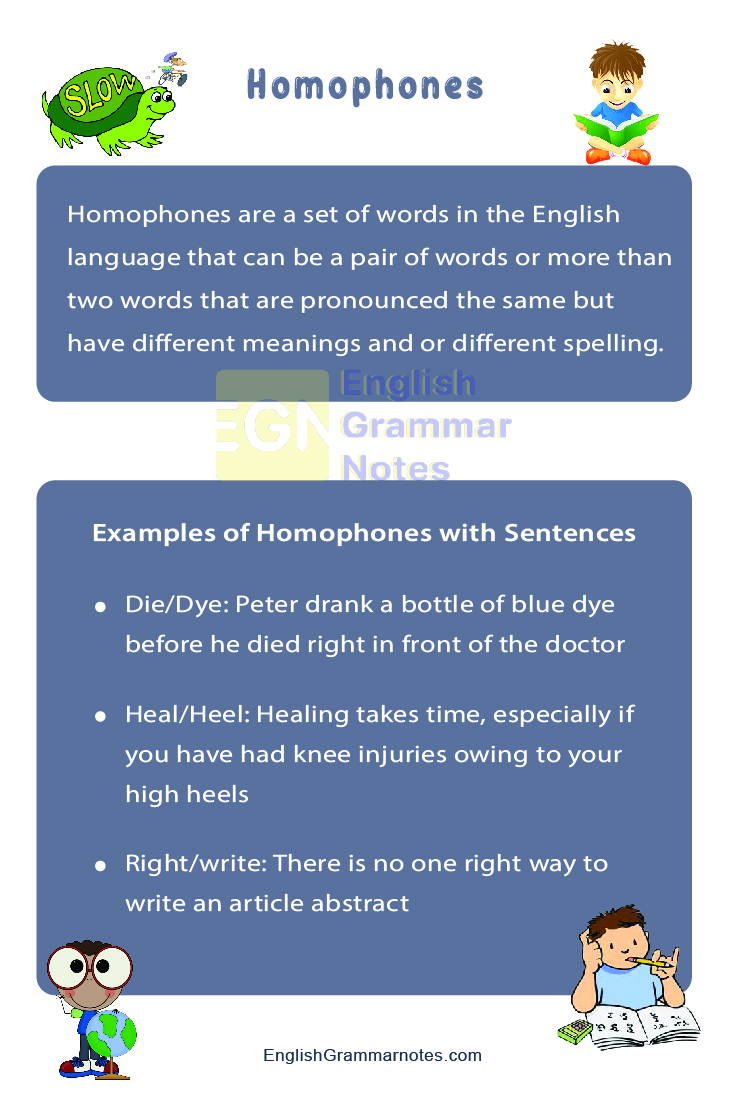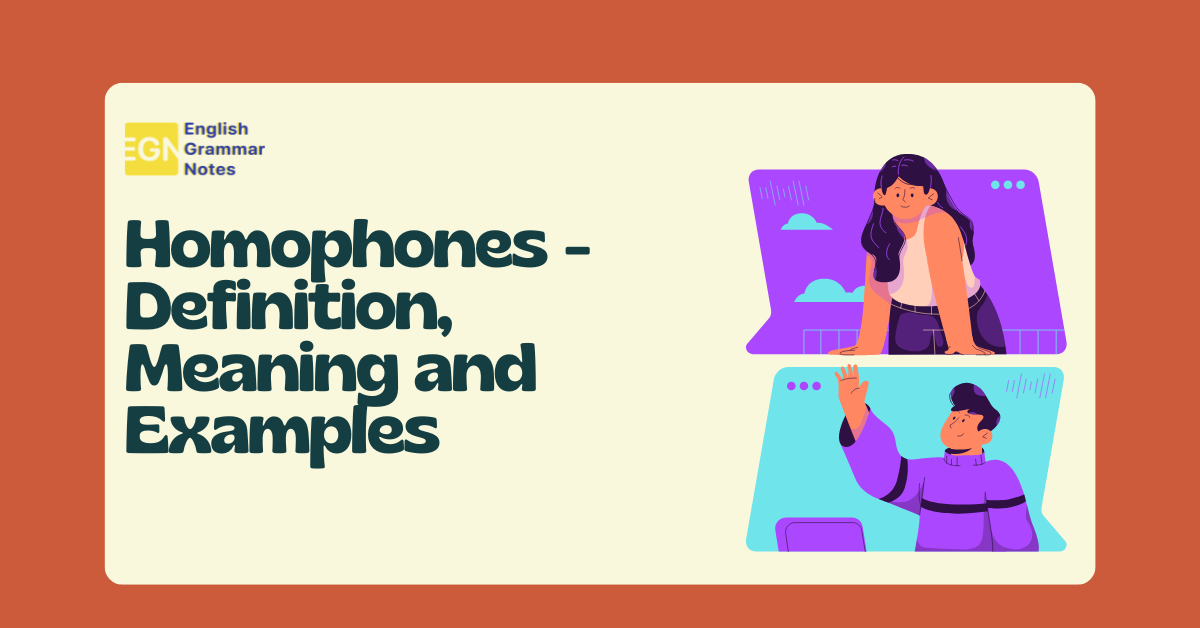In this section on Homophones, we are going to discuss the following details about Homophones that are going to help one understand the concept clearly Definition of Homophones, What are the 20 Examples of Homophones, the Difference between Homophones and Homonyms, Uses of Homophones. In fact, we have also mentioned the ways how to teach Homophones to Kids, Where are Homophones Used, etc.
- Homophones – Definition & Meaning
- Examples of Homophones with Sentences | Homophone Pairs in English
- Uses of Homophones
- How to Teach Most Confusing Words Homophones to Kids?
- Difference between Homonyms and Homophones?
- Benefits of Homophones in the English Language
- Where are Homophones Used?
- What is the difference between Homophones and Homographs?
- Where can we use Homophones in English?
Homophones – Definition & Meaning
Homophones are a set of words in the English language that can be a pair of words or more than two words that are pronounced the same but have different meanings and or different spelling. One should note that Homophones that have the same spelling can also be Homographs or Homonyms. Homophones that are spelled differently are usually termed Heterographs. Examples of Heterographs are too, too, and two.
In this particular article on Homophones, were going to discuss various examples of Homophones and their usage of the same in our day-to-day lives.
Examples of Homophones with Sentences | Homophone Pairs in English
Below we have given a comprehensive list of Homophones that can be used by students for their homework, project works, assignments, and tests. This list contains examples as well as sentence formation using Homophones.
- Die/Dye: Peter drank a bottle of blue dye before he died right in front of the doctor
- Heal/Heel: Healing takes time, especially if you have had knee injuries owing to your high heels
- Hour/our: We had one hour to complete the surprise test given by our math teacher after which all of our answer papers will be taken away
- Knot/Not: I still do not know to make a tie knot
- Right/write: There is no one right way to write an article abstract
- Sea/see: I always love to see the sea, especially during sunset and sunrise
- Accept/Except: Except for the last one, I had to accept all of the demands made by my subordinates at the office
- To/too: I had to take my dog to the vet, and my cat followed me too
- Affect/Effect: The way those oily fries affected my pocket was way more than it affected my stomach
- Bowled/Bold: The way Zaheer Khan bowled, was a bold move, given the match was at its tail end
- Grate/Great: One has to grate the carrot horizontally to make a really delicious and rather great carrot halwa
- Allusive/Elusive/Illusive: The book that he bought for my wedding was allusive/. It was rather elusive since it wasn’t found anywhere in the city and had a rather Illusive undertone to it.
Uses of Homophones
Homophones, as a good form of communication, can be used in the following circumstances:
- They are used to set a mood in a write-up, novel, or short story writing
- They can be effectively used in interviews and presentations to enhance one’s chance of getting ahead of others in the competition
- They can be used to properly frame sentences and enhance one’s usage of good vocabulary in the written form of communication. They come in handy in examinations and tests
- In the oral form of communication, Homophones can be used effectively to communicate one’s thoughts to others
How to Teach Most Confusing Words Homophones to Kids?
The following are some of the methods used to teach Homophones to kids:
- Fun activity/Play activity: Fun games and activities can be conducted in the classrooms to help students gain interest in learning about Homophones and other chapters of English. Games such as catch the word, Play up, debates, pick and speak, etc should be played in schools for kids
- Homeworks and assignments: Teachers can give students homework and assignments to write 100 examples of Homophones along with sentence formation using the same. This is an old-school method but highly effective
- Competition: Schools can conduct live debates, discussions, storytelling competitions, essay writing competitions, and other such mind-taxing activities as a part of the school curriculum to help students gain interest in the learning activities

Difference between Homonyms and Homophones?
Find the basic differences between both Homonyms and Homophones in English below. They are along the lines
- Homophones have the same spelling and different pronunciations but Homonyms have both pronunciation and spelling same
- Homonyms can be effectively Homophones and Homographs but Homophones can’t fall under this subset
- Both Homographs and Homonyms are loosely defined
Benefits of Homophones in the English Language
Homophones and their proper usage can bode well for an individual to make a good first impression. Homophones are used in the following situations:
- Essay writing
- Examination writing
- Public speaking
- Debates
- Storytelling
- Story writing
- Content writing
- Interview
- Casual communication
- Email drafting
- Report writing
If you are unable to speak or write in English, you can download our English Grammar Notes & study material for free that helps you to improve your English communication skills.
FAQs on Homophones
Homophones can be utilized in proper sentence formation that can aid well in written and oral communication
2. What is the difference between Homophones and Homographs?
Homographs have the same spelling but different meanings and pronunciations wherein Homophones are a group of words that have the same pronunciation but different meanings and spelling
3. Where can we use Homophones in English?
Homophones and their concept can be made use of well in English examinations and competitive papers.
Conclusion
A clear understanding of the concept of Homophones along with a clear difference between Homonyms, Homographs, Heterographs, and Homophones will be helpful not just for students but for everyone who needs to know the language of English and have a good grasp of the language. We say this because English is a universal language and anyone who has good communication skills, both written and oral, can come in handy in both professional and personal environments.
